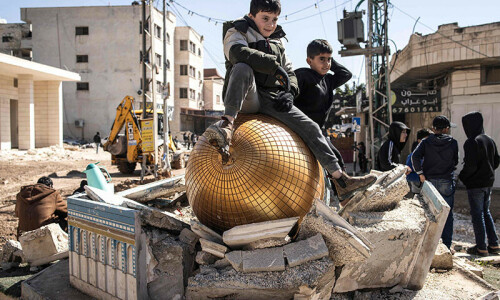 GHOTKI, July 13: At least 130 people were killed and about 170 injured when three passenger trains collided at the Sarhad Railway Station, about 49km from Sukkur, in the early hours of Wednesday. However, hospital sources here said that the crash had left at least 164 people dead and hundreds injured, many of them seriously.
GHOTKI, July 13: At least 130 people were killed and about 170 injured when three passenger trains collided at the Sarhad Railway Station, about 49km from Sukkur, in the early hours of Wednesday. However, hospital sources here said that the crash had left at least 164 people dead and hundreds injured, many of them seriously.
According to railway authorities, the driver of the Karachi Express misread the signal and ploughed into the stationary Quetta Express full of passengers, then the Karachi Express slammed head-on into the wreckage of the two trains.
The collision was so intense that people in far away areas heard the sound of the crash. At least 17 coaches of the three trains were completely damaged, while some carriages of the Karachi Express were reduced to scrap.
According to Deputy Superintendent Railways, Sukkur, Chaudhry Nazir Ahmed, the accident happened when the Quetta Express developed some fault and stopped for repairs at the Sarhad Station, seven kilometres from Ghotki, and the Karachi Express, coming from Lahore, rammed into it at 4am. The Karachi Express was travelling at a speed of 120km at that time, he said.
A number of carriages were catapulted onto an adjacent track where the Rawalpindi-bound Tezgam Express slammed head-on into the wreckage.
Most of the casualties were said to be on board the Tezgam.
The DS railway said apparently the driver of the Karachi Express misread a signal at the Sarhad Station that turned green to allow the Quetta Express to move off. He said the signal actually allowed the Quetta Express to move off, but the Karachi Express driver misread it and rammed into the rear part of the Quetta Express.
Chaudhry Nazir Ahmed said the driver of the Karachi Express, Ghulam Mohammad, and fireman Noor Hussain were killed in the accident, while its guard was missing. Quetta Express driver Din Mohammad, fireman Mohammad Yousuf and guard Sabir Hussain have also been killed, while the driver, fireman and guard of the Tezgam were injured. However, their names could not be ascertained.
The DS described the incident as the worst in the history of railway accidents at that track.
A railway official told Dawn that the accident occurred due to the fault of a point-man as it was his duty to change the track of the Karachi Express. Because of his failure, the Karachi Express instead of travelling on the loop line came directly on the main line, which resulted into the tragedy.
He said the point-man should have diverted the Quetta Express to the loop line to avoid the mishap, but even that could not be done.
Dr Ali Nawaz Shaikh and Dr Sattar Leghari, who were sent by the EDO Health, Larkana, to the Ghotki district, told Dawn by phone that the death toll had risen to 164.
According to them, 126 bodies were brought to Ghotki hospital, four to the CMH Pano Aqil, five to Mirpur Mathelo, five to Sukkur, while 24 bodies were shifted to other places from the accident site and Ghotki hospital.
However, railway authorities insisted that the death toll was 128. Despite various attempts the exact number of the dead and injured could not be ascertained. Railway authorities and the district administration of Ghotki did not provide names of the dead who had been identified.
The relief and rescue operation, being jointly conducted by PR personnel, Army jawans, police and residents, was continuing till late in the night.
Except for 40 critically injured who were being treated at Ghotki, Mirpur Mathelo hospitals and CMH Pano Aqil, the rest have been discharged.
In all, almost 2,000 people were aboard the three trains, many of them asleep at the time of the pre-dawn disaster.
After the accident, villagers of the area rushed to the scene and provided help to the crash victims.
General Officer Commanding Pano Aqil, Maj-Gen Ahmed Nawaz Saleem Mela, who visited the crash scene, told newsmen that army troops launched rescue work soon after they received the information. He said troops cordoned off the affected area. Those who received serious injuries were airlifted to nearby hospitals and to Multan by army helicopters.
He said over 100 ambulances, including many from the army, shifted the dead and injured to Ghotki and Mirpur Mathelo hospitals.
The crash site was strewn with decomposed bodies. Rescue workers used electric cutters to pull out bodies and wounded passengers from the smashed carriages. Decomposed parts of the bodies were collected in bags for proper identification.
Thousands of people had gathered at the site which posed difficulties in the rescue work. Though the army, rangers and police personnel had been deployed, people were still pouring in.
Eyewitnesses Riaz Ahmed and Ramzan, both residents of Bahawalpur, Zahoor Ahmed, an injured passenger from Sahiwal, and Farzana Awan told Dawn that passengers were asleep and woke up at the noise of a loud explosion and then there was a big jerk. Passengers’ luggage started falling onto the people, hurting them seriously. In the meantime, another huge explosion was heard, after which there was complete chaos. “We heard people screaming for help, and we saw blood everywhere and then we fainted.”
Another injured passenger Khurram, 13, and his sister said they were awake at the time of the accident. But their two-year-old sister was sleeping with their mother Naseem Begum. They said both of them fell unconscious when they saw their mother dead.
Khurram, a resident of Wazirabad survived along with his minor sister, whose name could not be ascertained, said his mother died in the crash while his father lost both legs.
The GOC of Pano Aqil and other military officials, with the help of railway authorities, arranged air-conditioned buses and coaches to shift unhurt passengers to their destination.
Sources said that 111 bodies had been brought to the Ghotki hospital alone, which also faced shortage of medicines to treat the injured.
The bodies were kept in a newly constructed hall which did not have proper cooling system, while some bodies had been kept in tents.
Volunteers were trying to identify the victims. The body of point-man Muneer Ahmed has been recovered while the gateman, whose name could not be ascertained, was missing.
In all, 19 coaches of the three trains were damaged, four economy class coaches of Quetta Express, three coaches of Karachi Express (two economy and one lower /AC) and 12 coaches of the Tezgam.
Relief trains from Rohri and Khanewal reached the accident site to clear the track. According to railway sources, heavy machinery and cranes have been sent to clear the track, which would take at least two days.
Track cleared
KARACHI: The up and down railway traffic at Sarhad railway station, near Ghotki, resumed at 8am on Wednesday. The first train to move out from the scene of accident was Quetta Express, which also carried the passengers of Karachi-bound night coach.
Meanwhile, the repair work of up track was started and railway sources said once the work was completed, complete traffic would be resumed.—APP












































